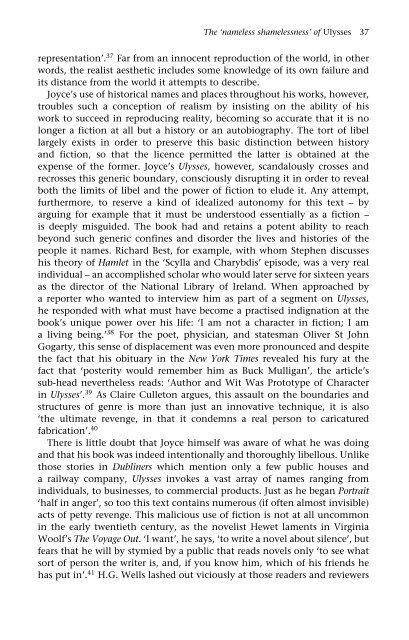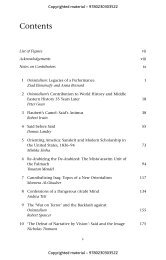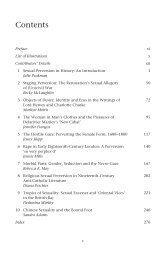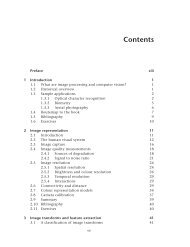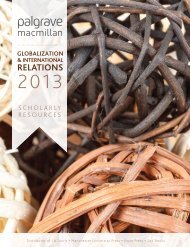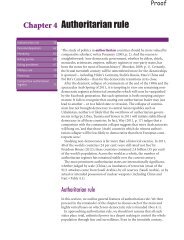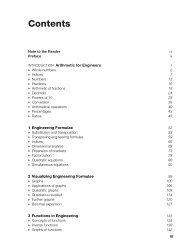The Nameless Shamelessness of Ulysses - Palgrave
The Nameless Shamelessness of Ulysses - Palgrave
The Nameless Shamelessness of Ulysses - Palgrave
Create successful ePaper yourself
Turn your PDF publications into a flip-book with our unique Google optimized e-Paper software.
<strong>The</strong> ‘nameless shamelessness’ <strong>of</strong> <strong>Ulysses</strong> 37<br />
representation’. 37 Far from an innocent reproduction <strong>of</strong> the world, in other<br />
words, the realist aesthetic includes some knowledge <strong>of</strong> its own failure and<br />
its distance from the world it attempts to describe.<br />
Joyce’s use <strong>of</strong> historical names and places throughout his works, however,<br />
troubles such a conception <strong>of</strong> realism by insisting on the ability <strong>of</strong> his<br />
work to succeed in reproducing reality, becoming so accurate that it is no<br />
longer a fiction at all but a history or an autobiography. <strong>The</strong> tort <strong>of</strong> libel<br />
largely exists in order to preserve this basic distinction between history<br />
and fiction, so that the licence permitted the latter is obtained at the<br />
expense <strong>of</strong> the former. Joyce’s <strong>Ulysses</strong>, however, scandalously crosses and<br />
recrosses this generic boundary, consciously disrupting it in order to reveal<br />
both the limits <strong>of</strong> libel and the power <strong>of</strong> fiction to elude it. Any attempt,<br />
furthermore, to reserve a kind <strong>of</strong> idealized autonomy for this text – by<br />
arguing for example that it must be understood essentially as a fiction –<br />
is deeply misguided. <strong>The</strong> book had and retains a potent ability to reach<br />
beyond such generic confines and disorder the lives and histories <strong>of</strong> the<br />
people it names. Richard Best, for example, with whom Stephen discusses<br />
his theory <strong>of</strong> Hamlet in the ‘Scylla and Charybdis’ episode, was a very real<br />
individual – an accomplished scholar who would later serve for sixteen years<br />
as the director <strong>of</strong> the National Library <strong>of</strong> Ireland. When approached by<br />
a reporter who wanted to interview him as part <strong>of</strong> a segment on <strong>Ulysses</strong>,<br />
he responded with what must have become a practised indignation at the<br />
book’s unique power over his life: ‘I am not a character in fiction; I am<br />
a living being.’ 38 For the poet, physician, and statesman Oliver St John<br />
Gogarty, this sense <strong>of</strong> displacement was even more pronounced and despite<br />
the fact that his obituary in the New York Times revealed his fury at the<br />
fact that ‘posterity would remember him as Buck Mulligan’, the article’s<br />
sub-head nevertheless reads: ‘Author and Wit Was Prototype <strong>of</strong> Character<br />
in <strong>Ulysses</strong>’. 39 As Claire Culleton argues, this assault on the boundaries and<br />
structures <strong>of</strong> genre is more than just an innovative technique, it is also<br />
‘the ultimate revenge, in that it condemns a real person to caricatured<br />
fabrication’. 40<br />
<strong>The</strong>re is little doubt that Joyce himself was aware <strong>of</strong> what he was doing<br />
and that his book was indeed intentionally and thoroughly libellous. Unlike<br />
those stories in Dubliners which mention only a few public houses and<br />
a railway company, <strong>Ulysses</strong> invokes a vast array <strong>of</strong> names ranging from<br />
individuals, to businesses, to commercial products. Just as he began Portrait<br />
‘half in anger’, so too this text contains numerous (if <strong>of</strong>ten almost invisible)<br />
acts <strong>of</strong> petty revenge. This malicious use <strong>of</strong> fiction is not at all uncommon<br />
in the early twentieth century, as the novelist Hewet laments in Virginia<br />
Woolf’s <strong>The</strong> Voyage Out. ‘I want’, he says, ‘to write a novel about silence’, but<br />
fears that he will by stymied by a public that reads novels only ‘to see what<br />
sort <strong>of</strong> person the writer is, and, if you know him, which <strong>of</strong> his friends he<br />
has put in’. 41 H.G. Wells lashed out viciously at those readers and reviewers


